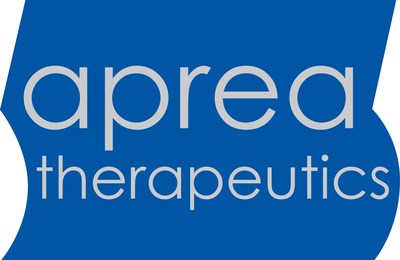

BOSTON and STOCKHOLM, June 17, 2018 /PRNewswire/ -- Aprea Therapeutics presented results at the 2018 EHA Annual Meeting from its Phase Ib/II clinical study in MDS. The ongoing study is evaluating the safety and efficacy of APR-246 in combination with azacitidine for the treatment of TP53 mutated MDS. The study is sponsored by the Moffitt Cancer Center with financial support from the MDS Foundation and the Aplastic Anemia and MDS International Foundation as administrator for the Evans MDS Clinical Research Consortium.

The overall response rate in 9 evaluable patients was 100%, with 8 patients achieving a complete response (CR) and 1 patient achieving a marrow CR (mCR). Median progression free survival (PFS) and overall survival (OS) have not been reached. One CR patient achieved mCR and partial cytogenetic response after receiving four days of APR-246 monotherapy. Relative to baseline, p53 immunohistochemistry scores, mutant TP53 variant allele frequency (VAF) and TP53 minimal residual disease (MRD) were significantly decreased at time of disease assessment. One additional patient, not yet evaluable for disease assessment by serial bone marrow biopsy, has also achieved hematologic improvement. Adverse events (AEs) during the APR-246 monotherapy lead-in phase were all grade 1 or grade 2. No dose-limiting toxicities have been experienced to date and no exacerbation of the expected AZA-related safety profile has been observed.
David Sallman, M.D., lead principal investigator of the clinical study from the Moffitt Cancer Center, said, "The emerging data from this study continue to be very encouraging. Responses have been achieved in all patients, including an 89% complete response rate, and have been accompanied by deep molecular remission as assessed by serial TP53 analysis. Furthermore, the available data indicate that the combination of APR-246 and azacitidine is safe and well-tolerated in these patients. Comparison of the current data set to historical AZA clinical experience suggests that combination of APR-246 with AZA may offer these patients a better potential treatment option than AZA alone."
About the Clinical Study
Eligible patients in the Phase Ib/II clinical study include HMA naïve, TP53 mutated MDS and oligoblastic acute myeloid leukemia (AML, ≤ 30% blasts). Patients receive APR-246 in a 3+3 dose escalation design (50, 75, 100 mg/kg lean body weight) IV daily over 4 days in a lead-in phase (days -14 to -10) followed by the same dose of APR-246 (days 1-4) and AZA 75 mg/m2 SC/IV over 7 days (days 4-10 or 4-5 and 8-12) in 28-day cycles. Primary objective of the clinical study is safety, with AEs graded by CTCAE v4.03 and DLT assessment over 6 weeks. Secondary endpoints include response rate by IWG 2006 criteria, PFS, OS, as well as serial next generation sequencing and p53 immunohistochemistry for evaluation of clonal suppression and depth of remission.
The design of the Phase Ib portion of the study includes dose escalation cohorts, with 3 in dose-level 1 (DL1), 3 in DL2 and 6 in DL3. At baseline, all currently enrolled patients (12) had poor- or very poor risk cytogenetics (17% poor, 83% very poor) and intermediate risk or higher disease by IPSS-R (8% intermediate, 17% high, 75% very high). Baseline median bone marrow blast percentage was 13% (range: 1 – 30%). Nine of twelve patients enrolled were response evaluable at data cutoff, with one patient discontinuing treatment prior to first disease assessment two patients whose treatment is ongoing but have not yet reached first disease assessment. One of the continuing non-evaluable patients has achieved hematological improvement.
About Myelodysplastic Syndrome
Myelodysplastic syndrome (MDS) represents a spectrum of hematopoietic stem cell malignancies in which bone marrow fails to produce sufficient numbers of healthy blood cells. Approximately 30-40% of MDS patients progress to acute myeloid leukemia (AML) and mutation of the p53 tumor suppressor protein is thought to contribute to disease progression. Mutations in p53 are found in up to 20% of MDS and AML patients and are associated with poor overall prognosis.
About p53 and APR-246
The p53 tumor suppressor gene is the most frequently mutated gene in human cancer, occurring in approximately 50% of all human tumors. These mutations are often associated with resistance to anti-cancer drugs and poor overall survival, representing a major unmet medical need in the treatment of cancer. Some cancers, including melanoma, express wild-type p53 that is nonetheless inactivated and non-functional.
APR-246 has been shown to reactivate mutant and inactivated p53 protein – by restoring wild-type p53 conformation and function – and thereby induce programmed cell death in human cancer cells. APR-246 has demonstrated pre-clinical anti-tumor activity in a wide variety of solid and hematological (blood) tumors, including ovarian cancer, small cell lung cancer, esophageal cancer and acute myeloid leukemia (AML), among others. Additionally, strong synergy has been seen with both traditional anti-cancer agents, such as chemotherapy, as well as newer mechanism-based anti-cancer drugs and immuno-oncology checkpoint inhibitors. In addition to pre-clinical testing, a Phase I/Ib clinical program with APR-246 has been completed, demonstrating a favorable safety profile and both biological and confirmed clinical responses in hematological malignancies and solid tumors with mutations in the p53 gene.
About Aprea Therapeutics
Aprea Therapeutics is a Boston, Massachusetts- and Stockholm, Sweden-based biopharmaceutical company focused on the discovery and development of novel anticancer compounds that reactivate the tumor suppressor protein, p53. The Company's lead drug candidate is APR-246, a first-in-class small molecule in clinical development for platinum-sensitive high-grade serious ovarian cancer, platinum-resistant high-grade serious ovarian cancer; myelodysplastic syndrome (MDS); esophageal cancer; and melanoma. Aprea is also developing second generation p53 reactivators that have best-in-class potential. In March 2016, Aprea completed a EUR 46 million Series B financing with an international syndicate co-led by Versant Ventures and 5AM Ventures, with additional participation by Sectoral Asset Management, HealthCap, acting as local lead investor, and existing investor, Karolinska Development. For more information, please visit www.apreatherapeutics.com.
Corporate Contacts:
Christian S. Schade
President and Chief Executive Officer
Gregory A. Korbel
Vice President of Business Development
SOURCE Aprea Therapeutics AB